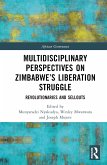Preventing Mass Atrocities
Policies and Practices
Herausgeber: Harff, Barbara; Gurr, Ted Robert
Preventing Mass Atrocities
Policies and Practices
Herausgeber: Harff, Barbara; Gurr, Ted Robert
- Gebundenes Buch
- Merkliste
- Auf die Merkliste
- Bewerten Bewerten
- Teilen
- Produkt teilen
- Produkterinnerung
- Produkterinnerung
The volume examines historical cases to understand the general causes and process of mass violence and genocide and also engages with on-going genocidal crises including Darfur and Syria, as well as other forms of related violence such as terrorism and civil conflict.
Andere Kunden interessierten sich auch für
![Constructing Genocide and Mass Violence Constructing Genocide and Mass Violence]() Maureen S HiebertConstructing Genocide and Mass Violence181,99 €
Maureen S HiebertConstructing Genocide and Mass Violence181,99 €![Mapping Global Justice Mapping Global Justice]() Arnaud KurzeMapping Global Justice160,99 €
Arnaud KurzeMapping Global Justice160,99 €![Irregular Migration and Human Security in East Asia Irregular Migration and Human Security in East Asia]() Irregular Migration and Human Security in East Asia191,99 €
Irregular Migration and Human Security in East Asia191,99 €![Unforgetting and the Politics of Representation Unforgetting and the Politics of Representation]() Tatjana TaksevaUnforgetting and the Politics of Representation172,99 €
Tatjana TaksevaUnforgetting and the Politics of Representation172,99 €![Remembering Genocide Remembering Genocide]() Remembering Genocide207,99 €
Remembering Genocide207,99 €![South America and Peace Operations South America and Peace Operations]() South America and Peace Operations56,99 €
South America and Peace Operations56,99 €![Multidisciplinary Perspectives on Zimbabwe's Liberation Struggle Multidisciplinary Perspectives on Zimbabwe's Liberation Struggle]() Multidisciplinary Perspectives on Zimbabwe's Liberation Struggle165,99 €
Multidisciplinary Perspectives on Zimbabwe's Liberation Struggle165,99 €-
-
-
The volume examines historical cases to understand the general causes and process of mass violence and genocide and also engages with on-going genocidal crises including Darfur and Syria, as well as other forms of related violence such as terrorism and civil conflict.
Hinweis: Dieser Artikel kann nur an eine deutsche Lieferadresse ausgeliefert werden.
Hinweis: Dieser Artikel kann nur an eine deutsche Lieferadresse ausgeliefert werden.
Produktdetails
- Produktdetails
- Verlag: Taylor & Francis
- Seitenzahl: 200
- Erscheinungstermin: 11. September 2018
- Englisch
- Abmessung: 234mm x 156mm x 13mm
- Gewicht: 476g
- ISBN-13: 9781138956001
- ISBN-10: 1138956007
- Artikelnr.: 52958852
- Herstellerkennzeichnung
- Libri GmbH
- Europaallee 1
- 36244 Bad Hersfeld
- gpsr@libri.de
- Verlag: Taylor & Francis
- Seitenzahl: 200
- Erscheinungstermin: 11. September 2018
- Englisch
- Abmessung: 234mm x 156mm x 13mm
- Gewicht: 476g
- ISBN-13: 9781138956001
- ISBN-10: 1138956007
- Artikelnr.: 52958852
- Herstellerkennzeichnung
- Libri GmbH
- Europaallee 1
- 36244 Bad Hersfeld
- gpsr@libri.de
Barbara Harff is Professor of Political Science Emerita at the US Naval Academy and was distinguished visiting professor at Clark University's Strassler Center for Holocaust and Genocide Studies. She co-founded the Genocide Prevention Advisory Network and served for a decade on the US Government's State Failure (later Political Instability) Task Force. In 2013 she received the Raphael Lemkin Award from the Auschwitz Institute for Peace and Reconciliation. Ted Robert Gurr was Distinguished University Professor of Political Science (Emeritus) at the University of Maryland; Founder and Consultant of the Minority at Risk Project; Former Senior Consultant to the US Government's Political Instability Task Force; Former Olof Palme Visiting Professor, HSFR, Uppsala University.
1. Introduction [Barbara Harff ] 2. Genocides and Mass Atrocities: Can They
Be Prevented? [Yehuda Bauer] Part 1: Risk Assessment, Early Warning, and
Early Response 3. Countries at Risk of New Genocides and Politicides after
2016 - And Why [Barbara Harff] 4. Atrocity Crimes as a Disease: A
Statistical Approach to Early Detection [Birger Heldt] 5. Early Prevention
of Genocide and Mass Atrocities? Evidence from Conflict Analysis [Ted
Robert Gurr] Part 2: Mobilizing International, Regional, and Local
Responses 6. Ending the Silence on War Crimes: A Journalist's Perspective
[Roy Gutman] 7. Preventing Mass Atrocities at the Local Level: Using
Village Committees for Conflict Prevention in Mauritania [Ekkehard Strauss]
8. In the Absence of Will: Could Genocide in Darfur have been Halted or
Mitigated? [Eric Reeves] 9. Atrocity Prevention from Obama to Trump [James
P. Finkel] 10. Prevention through Political Agreements: The Community of
Sant'Egidio and Central African Republic [Andrea Bartoli and Mauro
Garofolo] 11. An African Regional Perspective on Prevention [Liberata
Mulamula and Ashad Sentongo] 12. Roots of Ambivalence: The United Nations,
Genocide, and Mass Atrocity Prevention [Edward C. Luck] 13. Who is in
Charge? Emerging National and Regional Strategies for Prevention [Andrea
Bartoli and Tetsushi Ogata] 14. Guidelines for Prevention of Genocides and
other Mass Atrocities: An Overview [Ted Robert Gurr]
Be Prevented? [Yehuda Bauer] Part 1: Risk Assessment, Early Warning, and
Early Response 3. Countries at Risk of New Genocides and Politicides after
2016 - And Why [Barbara Harff] 4. Atrocity Crimes as a Disease: A
Statistical Approach to Early Detection [Birger Heldt] 5. Early Prevention
of Genocide and Mass Atrocities? Evidence from Conflict Analysis [Ted
Robert Gurr] Part 2: Mobilizing International, Regional, and Local
Responses 6. Ending the Silence on War Crimes: A Journalist's Perspective
[Roy Gutman] 7. Preventing Mass Atrocities at the Local Level: Using
Village Committees for Conflict Prevention in Mauritania [Ekkehard Strauss]
8. In the Absence of Will: Could Genocide in Darfur have been Halted or
Mitigated? [Eric Reeves] 9. Atrocity Prevention from Obama to Trump [James
P. Finkel] 10. Prevention through Political Agreements: The Community of
Sant'Egidio and Central African Republic [Andrea Bartoli and Mauro
Garofolo] 11. An African Regional Perspective on Prevention [Liberata
Mulamula and Ashad Sentongo] 12. Roots of Ambivalence: The United Nations,
Genocide, and Mass Atrocity Prevention [Edward C. Luck] 13. Who is in
Charge? Emerging National and Regional Strategies for Prevention [Andrea
Bartoli and Tetsushi Ogata] 14. Guidelines for Prevention of Genocides and
other Mass Atrocities: An Overview [Ted Robert Gurr]
1. Introduction [Barbara Harff ] 2. Genocides and Mass Atrocities: Can They
Be Prevented? [Yehuda Bauer] Part 1: Risk Assessment, Early Warning, and
Early Response 3. Countries at Risk of New Genocides and Politicides after
2016 - And Why [Barbara Harff] 4. Atrocity Crimes as a Disease: A
Statistical Approach to Early Detection [Birger Heldt] 5. Early Prevention
of Genocide and Mass Atrocities? Evidence from Conflict Analysis [Ted
Robert Gurr] Part 2: Mobilizing International, Regional, and Local
Responses 6. Ending the Silence on War Crimes: A Journalist's Perspective
[Roy Gutman] 7. Preventing Mass Atrocities at the Local Level: Using
Village Committees for Conflict Prevention in Mauritania [Ekkehard Strauss]
8. In the Absence of Will: Could Genocide in Darfur have been Halted or
Mitigated? [Eric Reeves] 9. Atrocity Prevention from Obama to Trump [James
P. Finkel] 10. Prevention through Political Agreements: The Community of
Sant'Egidio and Central African Republic [Andrea Bartoli and Mauro
Garofolo] 11. An African Regional Perspective on Prevention [Liberata
Mulamula and Ashad Sentongo] 12. Roots of Ambivalence: The United Nations,
Genocide, and Mass Atrocity Prevention [Edward C. Luck] 13. Who is in
Charge? Emerging National and Regional Strategies for Prevention [Andrea
Bartoli and Tetsushi Ogata] 14. Guidelines for Prevention of Genocides and
other Mass Atrocities: An Overview [Ted Robert Gurr]
Be Prevented? [Yehuda Bauer] Part 1: Risk Assessment, Early Warning, and
Early Response 3. Countries at Risk of New Genocides and Politicides after
2016 - And Why [Barbara Harff] 4. Atrocity Crimes as a Disease: A
Statistical Approach to Early Detection [Birger Heldt] 5. Early Prevention
of Genocide and Mass Atrocities? Evidence from Conflict Analysis [Ted
Robert Gurr] Part 2: Mobilizing International, Regional, and Local
Responses 6. Ending the Silence on War Crimes: A Journalist's Perspective
[Roy Gutman] 7. Preventing Mass Atrocities at the Local Level: Using
Village Committees for Conflict Prevention in Mauritania [Ekkehard Strauss]
8. In the Absence of Will: Could Genocide in Darfur have been Halted or
Mitigated? [Eric Reeves] 9. Atrocity Prevention from Obama to Trump [James
P. Finkel] 10. Prevention through Political Agreements: The Community of
Sant'Egidio and Central African Republic [Andrea Bartoli and Mauro
Garofolo] 11. An African Regional Perspective on Prevention [Liberata
Mulamula and Ashad Sentongo] 12. Roots of Ambivalence: The United Nations,
Genocide, and Mass Atrocity Prevention [Edward C. Luck] 13. Who is in
Charge? Emerging National and Regional Strategies for Prevention [Andrea
Bartoli and Tetsushi Ogata] 14. Guidelines for Prevention of Genocides and
other Mass Atrocities: An Overview [Ted Robert Gurr]








